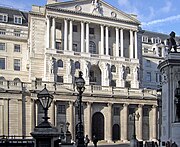
A central bank, reserve bank, or monetary authority is the entity responsible for the monetary policy of a country or of a group of member states. Its primary responsibility is to maintain the stability of the national currency and money supply, but more active duties include controlling subsidized-loan interest rates, and acting as a lender of last resort to the banking sector during times of financial crisis (private banks often being integral to the national financial system). It may also have supervisory powers, to ensure that banks and other financial institutions do not behave recklessly or fraudulently.
Most richer countries today have an "independent" central bank, that is, one which operates under rules designed to prevent political interference. Examples include the European Central Bank (ECB) and the Federal Reserve System in the United States. Some central banks are publicly owned, and others are privately owned. For example, the Reserve Bank of India is publicly owned and directly governed by the Indian government. The major difference is that government owned central banks do not charge the taxpayers interest on the national currency, whereas privately owned central banks do charge interest.
Currency issuance

Many central banks are "banks" in the sense that they hold assets (foreign exchange, gold, and other financial assets) and liabilities. A central bank's primary liabilities are the currency outstanding, and these liabilities are backed by the assets the bank owns.
Central banks generally earn money by issuing currency notes and "selling" them to the public for interest-bearing assets, such as government bonds. Since currency usually pays no interest, the difference in interest generates income. In most central banking systems, this income is remitted to the government. The European Central Bank remits its interest income to its owners, the central banks of the member countries of the European Union.
Although central banks generally hold government debt, in some countries the outstanding amount of government debt is smaller than the amount the central bank may wish to hold. In many countries, central banks may hold significant amounts of foreign currency assets, rather than assets in their own national currency, particularly when the national currency is fixed to other currencies.
FOR MORE VISIT-http://www.bis.org/publ/bppdf/bispap09a.pdf










